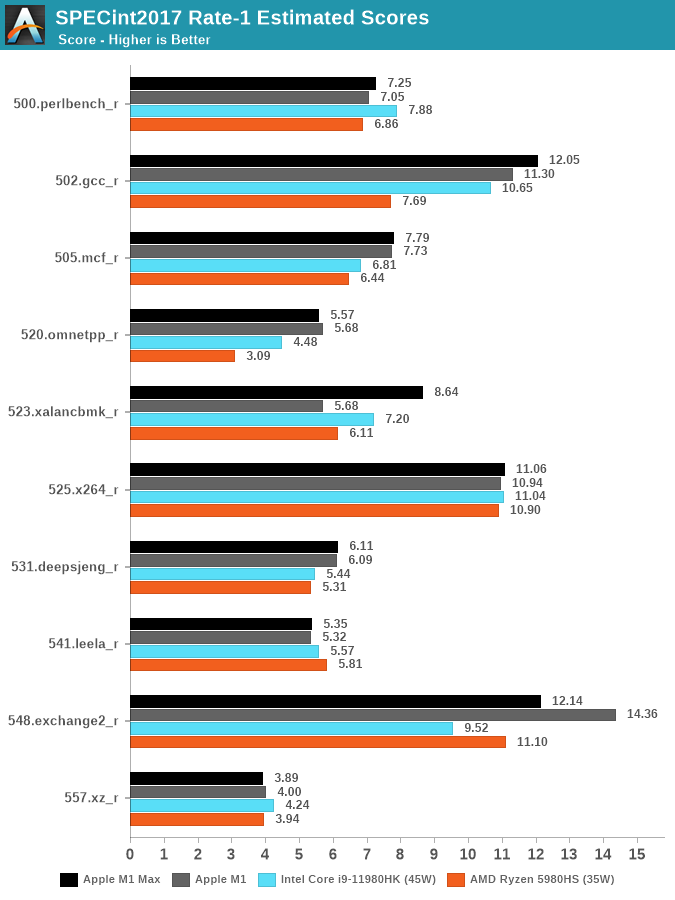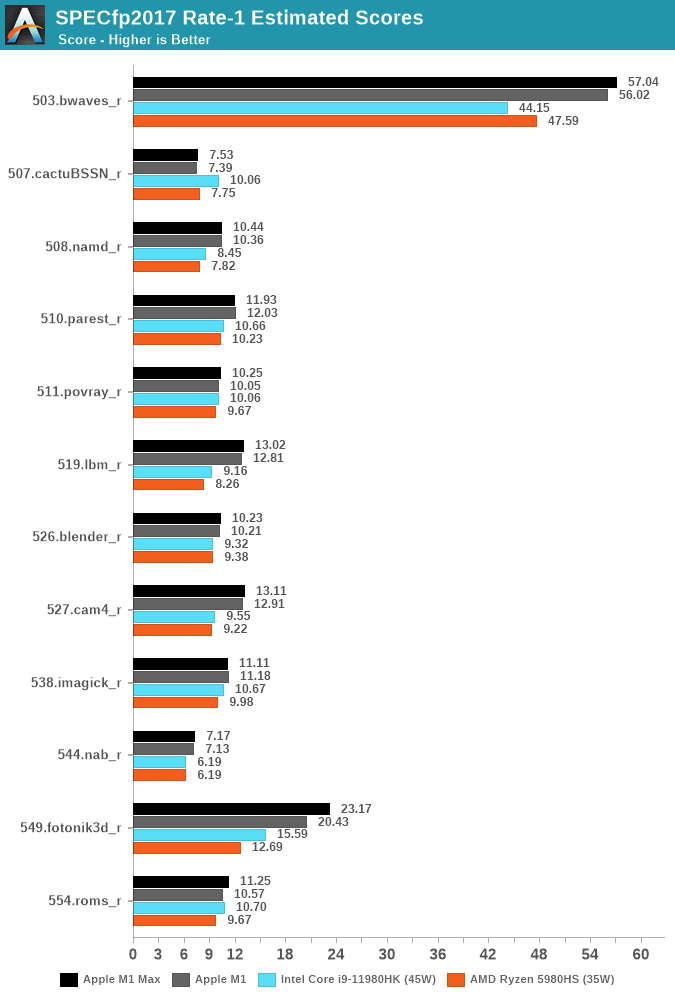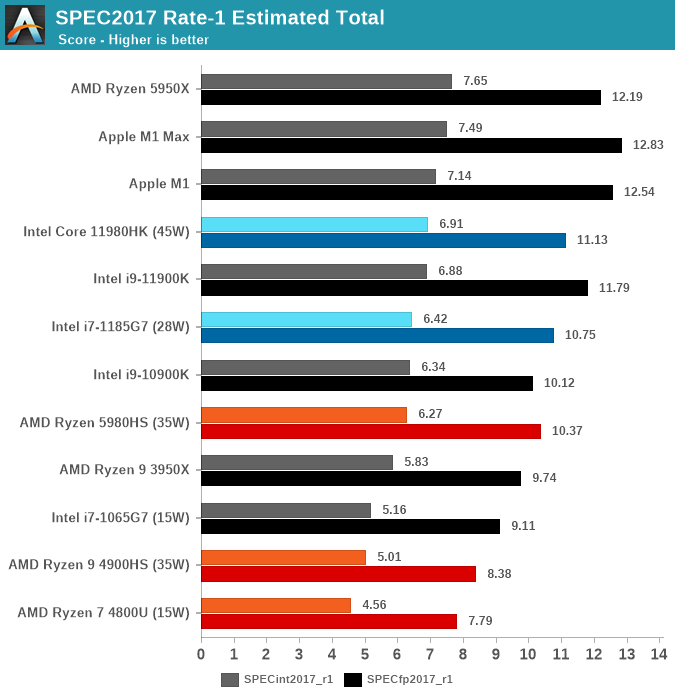Apple's M1 Pro, M1 Max SoCs Investigated: New Performance and Efficiency Heights
by Andrei Frumusanu on October 25, 2021 9:00 AM EST- Posted in
- Laptops
- Apple
- MacBook
- Apple M1 Pro
- Apple M1 Max
CPU ST Performance: Not Much Change from M1
Apple didn’t talk much about core performance of the new M1 Pro and Max, and this is likely because it hasn’t really changed all that much compared to the M1. We’re still seeing the same Firestrom performance cores, and they’re still clocked at 3.23GHz. The new chip has more caches, and more DRAM bandwidth, but under ST scenarios we’re not expecting large differences.
When we first tested the M1 last year, we had compiled SPEC under Apple’s Xcode compiler, and we lacked a Fortran compiler. We’ve moved onto a vanilla LLVM11 toolchain and making use of GFortran (GCC11) for the numbers published here, allowing us more apple-to-apples comparisons. The figures don’t change much for the C/C++ workloads, but we get a more complete set of figures for the suite due to the Fortran workloads. We keep flags very simple at just “-Ofast” and nothing else.

In SPECint2017, the differences to the M1 are small. 523.xalancbmk is showcasing a large performance improvement, however I don’t think this is due to changes on the chip, but rather a change in Apple’s memory allocator in macOS 12. Unfortunately, we no longer have an M1 device available to us, so these are still older figures from earlier in the year on macOS 11.
Against the competition, the M1 Max either has a significant performance lead, or is able to at least reach parity with the best AMD and Intel have to offer. The chip however doesn’t change the landscape all too much.

SPECfp2017 also doesn’t change dramatically, 549.fotonik3d does score quite a bit better than the M1, which could be tied to the more available DRAM bandwidth as this workloads puts extreme stress on the memory subsystem, but otherwise the scores change quite little compared to the M1, which is still on average quite ahead of the laptop competition.

The M1 Max lands as the top performing laptop chip in SPECint2017, just shy of being the best CPU overall which still goes to the 5950X, but is able to take and maintain the crown from the M1 in the FP suite.
Overall, the new M1 Max doesn’t deliver any large surprises on single-threaded performance metrics, which is also something we didn’t expect the chip to achieve.










493 Comments
View All Comments
Ryan Smith - Monday, October 25, 2021 - link
MSI took back the Raider, which is why we only have data for benchmarks we're previously run on it.As for the Mac, I can confirm it runs at full perf even on a battery. I've not seen the GPU pass 45W.
daveinpublic - Monday, October 25, 2021 - link
Huh, nice way to hijack the top comment.FreckledTrout - Monday, October 25, 2021 - link
"The chips here aren’t only able to outclass any competitor laptop design, but also competes against the best desktop systems out there, you’d have to bring out server-class hardware to get ahead of the M1 Max – it’s just generally absurd."Agree. Its crazy a company whos side job is making chips is competing with Intel and AMD so well.
goatfajitas - Monday, October 25, 2021 - link
Not really. Ever since Apple got caught cheating in benchmarks way back when it was Power PC vs Intel they set a goal to master the benchmark game and that they have done - They have mastered the benchmark game. If you are into benchmarks Apple is a great thing for you to buy.spdcrzy - Monday, October 25, 2021 - link
This is my biggest worry. Benchmarks are all well and good, but many professional CAD, data analysis, and other performance-hungry applications are x64/x86 native. I have yet to see CFD, FEA, or BI programs natively supported on M1 silicon, for example. That will be the true test of performance.foheng - Monday, October 25, 2021 - link
This is literally the dumbest thing I’ve read.Hifihedgehog - Monday, October 25, 2021 - link
> This is literally the dumbest thing I’ve read.If you are speaking of the statement itself you wrote above, we appreciate your self-awareness.
foheng - Monday, October 25, 2021 - link
How clever. “I know you are but what am I” springs to mind.The poster stated Apple cheats on benchmarks. Maybe they’ve forgotten all the years of iPhone processors and how well they performed and forgot about all the Android vendors caught cheating in benchmarks, many spotted right here by Anandtech.
But so go on and explain to us all the examples of Apple getting caught cheating. Especially as they relate to the M1 versions of processors.
daveinpublic - Monday, October 25, 2021 - link
He wasn't.Makaveli - Monday, October 25, 2021 - link
lol Burn!